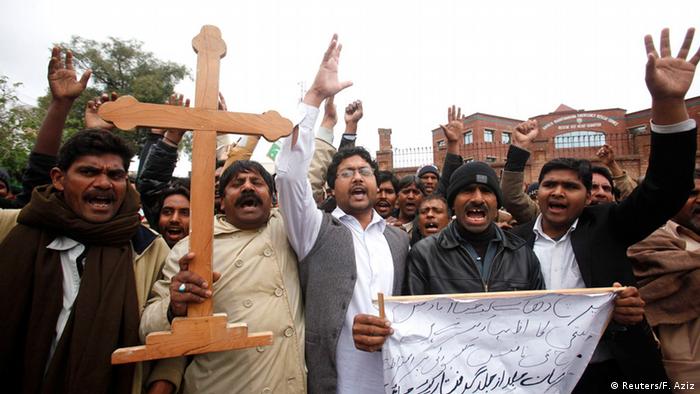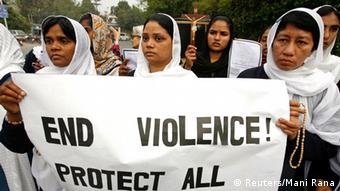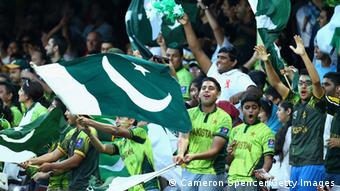The day when Islamists attacked churches in Lahore, most Pakistanis were celebrating the national cricket team's win over Ireland. Such is the apathy of the common Pakistanis regarding the plight of minorities.
"These attacks happen every second day in Pakistan. There isn't much to celebrate in this country, so why shouldn't we revel in the victory of our cricket team in the World Cup?" Hammad Yusuf, a university student in Karachi, told DW.
Yusuf's sentiments are also reflected in the local media: There was scant coverage of the suicide bombings on two churches in Lahore's Youhanabad area on Sunday, March 15 while TV channels gave more airtime to Pakistan's qualification to the Cricket World Cup's quarter-finals in Australia-New Zealand. The cricket story also dominated social media as Pakistan's Facebook and Twitter users congratulated the national squad on its triumph over Ireland.
Living in fear
But for the Christian community in Pakistan, which forms 1.6 percent of the country's population, the persecution, massacres, and the legal and social discrimination in the Islamic Republic are never ending.
The twin bombings in Lahore, which killed 14 people and wounded over 50, are a routine affair in the predominantly Sunni nation. In September 2013, two suicide bombers blew themselves up in the courtyard of Peshawar's All Saints church, killing 82 people and leaving as many injured. The attack on the church in the northwestern Pakistani city is believed to be the deadliest ever against the Christian community.
One of the most violent attacks on Christians and their places of worship in Pakistan was carried out in 2009 in the central Gojra town of the Punjab when Muslims burnt more than 70 Christian houses and many churches, killing seven people, after a rumor that the Koran had been desecrated.
The Christians in Pakistan live under constant fear of the blasphemy law. Rights activists, however, say the law is often implemented in cases which have little to do with blasphemy. They believe the blasphemy law is used to settle petty disputes and personal vendettas. Christians, Hindus and Ahmadis are often victimized as a result.
Experts say that Christians fear militants and common Pakistanis alike. The fact that most people did not unequivocally condemn the recent Lahore bombings and chose to revel in their cricket team's win was proof of anti-minority sentiment, some observers underline. "The days are gone when we said it was a small group of religious extremists, xenophobes, hate-mongers, and bigots who commit such crimes," Karachi-based journalist Mohsin Sayeed told DW. "Now the venom has spread to the whole of Pakistani society." He added that those who condemned such "barbaric crimes" were now a minority in the country.
Asad Butt of the Human Rights Commission of Pakistan (HRCP) agrees: "Religious intolerance is definitely growing in Pakistan," Butt told DW.
Taking matters into their own hands
Some 5,000 Christians took to the streets in Lahore on Monday, March 16, and shouted anti-government slogans in a second day of protests against suicide bombings. The attacks also sparked mob violence with Christians smashing up cars and a bus station in a show of anger.
"We have taken to the streets to get justice, we want protection," 50-year-old protester Maqbool Bhatti told the news agency AFP. Bhatti, a government employee, said that Prime Minister Nawaz Sharif's government had failed to provide security to the country's Christians. "There was no proper security on Sunday, the government should protect all churches," he added.
Samson Salamat, a Christian community leader, said the government must formulate a national plan to deal with the situation. He denied reports that Christians were involved in violent protests. "I fear that some people are trying to tarnish the image of our peaceful community. Christians in Pakistan have never taken the law into their hands," Salamat told DW correspondent, Tanvir Shahzad, in Lahore.
Zaeem Qadri, spokesman of the Punjab's provincial government, told DW that adequate security was provided to churches prior to the attacks. "It was an attack on Pakistan. It was a reaction against operation Zarb-e-Azb which the government has initiated against extremists. We will not let militants damage relations between Muslims and Christians," said Qadri.
Despite government assurances, Pakistani Christians say they have no faith in the authorities anymore. Christian volunteers have set up their own check points around Youhanabad and have cordoned off their places of worship in various parts of the eastern city ahead of funerals planned on Tuesday for those killed in Sunday's attacks.
On Monday, special prayers were held at churches across the country, as well as candle-light vigils by Christian groups and members of civil society.
"The state has no intention to protect the minorities and the majority Muslims are least bothered about their plight," said Waqas Ahmed, a civil society activist in Lahore. "Holding vigils is the least we can do for our Christian brothers and sisters."




No comments:
Post a Comment